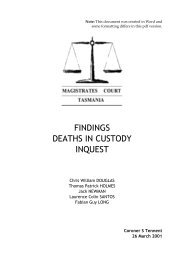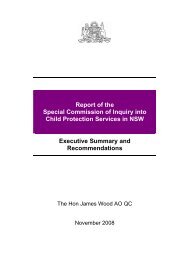Professor Graham Zellick
Professor Graham Zellick
Professor Graham Zellick
Create successful ePaper yourself
Turn your PDF publications into a flip-book with our unique Google optimized e-Paper software.
The Causes of Miscarriages of Justice, <strong>Graham</strong> <strong>Zellick</strong> 13current time: historic sex abuse cases, rape, expertevidence, over-complex law and inadequate legalrepresentation.Let me start then with the meaning of “miscarriageof justice”, or as one correspondent wrote to theCommission a “carriage of misjustice”, which actuallyis rather a nice way of putting it. Now, “miscarriageof justice” does have a technical meaning instatute law in relation to compensation for wrongfulconvictions. We don’t need to concern ourselveswith that this evening and I am not using the termin that particularly technical context. The legislationestablishes that certain people whose convictionsare quashed on appeal are entitled to compensation.It seeks to distinguish certain kinds of wrongful convictionfrom others in an effort to protect the publicpurse, but that is purely technical and we don’thave to bother with that. Nor do we have to botherwith the fact that “miscarriage of justice” arises inScotland as a synonym for “unsafe conviction” andthe test which the Scottish CCRC, therefore,applies in referring cases to the Scottish AppealCourt. We can forget all that. I am using it in no technicalsense at all. I am using it in the sense of“wrongful conviction”, which similarly is not a technicalor a statutory term. It is a question of labels andI don’t want us to be side-tracked by any of that.Some wrongful convictions may justify or warrantthe label of “miscarriage of justice”, others maynot. For present purposes that doesn’t matter. WhatI want to look at is why we get it wrong sometimes,what the causes are and what we can do to get it right.Some failings are clearly more important than others,but I think you will understand that more as weproceed.By “wrongful conviction” I mean this: it is wheresomeone who has been convicted and whose appealor application for leave to appeal has been unsuccessfulshould now have the conviction quashed. That’s awrongful conviction. It follows that if what is nowknown were known earlier the person would not ormight not have been convicted. Now why do I haveto add there “or might not have been convicted”?That is because it may be an error which raises aquestion about how the jury would have decidedthe case if the error had not been made, and it mayhave to be resolved in favour of the appellant. Ofcourse, had the error not been made, the jury mightstill have convicted, but we can’t always be sureand so it will often have to be resolved in favour ofthe accused. In certain circumstances it is possiblethen to do it correctly at a retrial. Wrongful convictionis in part (and I emphasise in part) explainedby what the CACD does, which is to quash unsafeconvictions. That is the sole statutory basis onwhich the court can quash a conviction, if it isunsafe, but there is no definition in statute of whatis unsafe, that is left to the courts to decide, andI will be saying a bit more about that shortly.Now, why do I say a wrongful conviction is in partexplained by what the CACD does in quashingunsafe convictions? I say “in part” because theremay well be convictions (and I will be arguingpresently that this is so) regarded by the CACD assafe which may nevertheless be problematic andought to be quashed. There is, therefore, arguably acategory of convictions which the Court of Appealwill not disturb but which are or may neverthelessbe miscarriages of justice, and of course if thatthesis is correct it is a serious matter.Now, I have spoken of wrongful convictions,miscarriages of justice and unsafe convictions (andI suspect you are getting a bit confused now), butthe one thing I haven’t spoken about – and havingexplained now why I haven’t I won’t have occasionto refer to it again! – is innocence. The opposite ofguilty is not innocence but not guilty. This is apoint of critical importance, but often misunderstoodeven by people closely involved with criminaljustice. The defendant, as you know, doesn’t haveto prove he didn’t do it; it is for the Crown toprove the case beyond reasonable doubt. The defendantis entitled to be acquitted when that hasn’tbeen done, or even when the right to a fair trial hasbeen fundamentally violated or abridged, and thatremains the constant standard throughout a trial, onappeal and in any later post-appeal review. TheCCRC is not infrequently criticised for losing sightof innocence and I have lost count of the numberof times I have endeavoured to explain that if wewere to have innocence in sight we would beseriously failing in our role. It is a fundamentalvalue of criminal law and the criminal justicesystem, those principles and values that I havelisted, and to focus on innocence at some point inthe process would subvert those principles, alter thebalance and profoundly disadvantage the victims ofa miscarriage of justice. We can rarely know for
14 Medico-Legal Journal 78/1certain that a defendant is actually innocent, even inmany of the celebrated miscarriage of justice cases. Itis a very rare case indeed, not unknown, but it is avery rare case indeed when we can say that we are100% certain that the defendant is indeed wholly factuallyinnocent. So my working definition of anunsafe conviction is not a ringing declaration of innocencebut something much more prosaic: a convictionis unsafe where there has been some legal,procedural or evidential irregularity which bringsthe validity or legality of the conviction into question,or where the irregularity or new evidence orargument is such that the jury might otherwise havereturned a different verdict.Now, if one studies the jurisprudence of the Courtof Appeal it seems to me that, uncontroversially, onecan divide unsafe convictions into five different categories.First and foremost, there is new evidencewhich, had it been before the jury, might have produceda different verdict. There can be no questionabout this being the pre-eminent category of miscarriageof justice. New evidence may take many differentforms – new forensic, medical or psychiatricevidence, new witnesses, evidence throwing doubton the credibility or veracity of a witness and soon. Sometimes the new evidence is so compellingthat the conviction has no chance of surviving. Inother cases it will be much more a matter of finejudgment.Secondly, there is procedural or other irregularityor mistake of law which leaves a doubt aboutwhether the jury’s verdict would have been thesame without the error. This covers such things as amisdirection by the judge, the admissibility of evidencethat should have been excluded or nondisclosureof evidence. There are even instanceswhere in law the facts don’t constitute the offencecharged or there is some statutory bar on prosecutionwhich has been disregarded. Obviously these are allthings that ideally ought to have been picked upmuch sooner and certainly by the time of the originalappeal, but it doesn’t always happen.Thirdly, there is serious irregularity constitutingwhat is called an abuse of process or resulting in atrial falling short of the basic standards of fairness,which in some instances may cover cases of unfairnesscontrary to Article 6 of the EuropeanConvention on Human Rights, and the reason whythis is a separate category from the previous one isthat in this category the irregularity or abuse has nobearing on the accused’s actual guilt; in otherwords, the failing in itself is such that the convictionought not to stand regardless of the culpability ofthe defendant. This was a category that the presentgovernment recently tried to abolish but eventually,after much argument and disquiet, the proposal wasabandoned.Fourthly, there is what used to be called “lurkingdoubt”, but is now hardly acknowledged at all,where there is no new evidence, there has been noirregularity but the Court of Appeal neverthelesshas a serious reservation about the jury’s verdict.Excessive deference to the jury’s verdict was one ofthe principal problems with the CACD, identifiedby the Runciman Royal Commission on CriminalJustice, which led to the establishment of theCCRC in the 1990s. Let me just read you the paragraphin the Runciman Report:“In its approach to the consideration of appealsagainst conviction the Court of Appeal seems tous to have been too heavily influenced by therole of the jury in Crown Court trials. Ever since1907 commentators have detected a reluctanceon the part of the Court of Appeal to considerwhether a jury has reached a wrong decision.This impression is underlined by research conductedon our behalf. This shows that mostappeals are allowed on the basis of errors at thetrial, usually in the judge’s summing-up. We areall of the opinion that the Court of Appealshould be readier to overturn jury verdicts than ithas shown itself to be in the past. We accept thatit has no means of putting itself in the place ofthe jury as far as seeing and hearing the witnessesconcerned. Nevertheless, the court should be morewilling to consider arguments that indicate that ajury might have made a mistake.”I sense that the Court of Appeal is even more reluctanttoday than it was in the years preceding theRunciman Report to quash convictions on thisground. If the court’s approach were to change, notonly would it see some dubious convictionsquashed but it would also send a powerful messageto trial judges to stop cases going to the jury ordirecting an acquittal more often than is currentlythe case. The court’s reluctance to interfere in these
The Causes of Miscarriages of Justice, <strong>Graham</strong> <strong>Zellick</strong> 15cases also, incidentally and importantly, constitutes abarrier to any meaningful intervention in such casesby the CCRC.Finally, and just for the sake of completeness, isa category that you don’t need to trouble yourselfover much with this evening, but it is a situationwhere the case law has changed, to the defendant’sadvantage, since the date of the conviction, in thelight of which the conviction now appears unsafe.There has been some recent legislation on that. If itis something of interest to you I will be happy toanswer any questions, but otherwise I think it isbest to move on.Now, how do wrongful convictions arise? Theyarise in three different ways: first, there are thosewhere no-one in the process from beginning to endcan be faulted, the system worked well, the lawitself and its procedures were not found deficient,but something emerged or was discovered at a laterdate which showed that the decision was wrong.New evidence may have come to light as a resultof scientific advances, a witness may appear ofwhom there was no knowledge at the time, or somepiece of physical evidence is discovered that couldnot previously have been obtained. Such things willalways happen, and that is one reason why there isthe need for a body like the CCRC in any criminaljustice system, however good it is.Secondly, there are those cases where individualswere responsible or at fault. It may have been someone’snegligence, an error of judgement or the resultof a witness fabricating a complaint or other evidence,deliberately lying or making a simplemistake. Errors in forensic science and other expertevidence have led to a significant number of miscarriagesof justice in recent years. There will always bemistakes, negligence and wicked people, with theresult that on occasion justice will miscarry. All ofhuman activity, the criminal justice system included,is imperfect and, sadly, justice will not alwaysprevail.Thirdly, there are those unsafe convictions thatarise from faults or weaknesses in the system itselfwhere the particular practices, rules or laws or,more broadly, a whole area raises special difficultiesand challenges. These are areas which call for specialalertness, where we need to identify current failings,shortcomings or defects and where efforts should bemade to promote reform.Now, I want to elaborate on some of thesecategories by looking first at the responsibility ofsome of the criminal justice agencies and thenI want to say a few words about some of those problematicareas that I was just alluding to.I will start with the Crown Prosecution Service.Crown Prosecution ServiceThe decision of whether to charge and, if so, withwhat, which now falls to the CPS, is of great significance.Of course, it is true that if the initial decisionto proceed is wrong, then correction ought to comeabout later in the process, but this does not alwaysseem to be the case and weak prosecutions sometimeslead to convictions. That initial decision bythe prosecutor, as well as their continued conductof the case, is of critical importance.Trial JudgesSecondly, trial judges, in my view, should (particularlyin some of the more difficult areas thatI shall detail presently) exercise a more vigorousline in preventing cases from going to the jurywhere there is insufficient evidence to support asound conviction or there has been what is calledan abuse of process. Again, I have seen too manycases where juries have convicted on the basis ofevidence that in my view could not possibly besaid to support a safe conviction; the standard ofproof in practice appears to me to have beendiluted; and of course this situation is exacerbatedby the reluctance of the Court of Appeal to gobehind the jury’s verdict.Now I come to the Court of Appeal.Court of AppealThe Runciman Commission was right and it isindeed regrettable that they exercise their power toquash in those cases identified by the RuncimanCommission less frequently than they did evenbefore the Commission reported. I am not surewhy that is but I have a hunch it may have somethingto do with the existence of the CCRC,which would be ironic. Of course I recognise thedifficulties of too readily setting aside the verdictsof a jury, but juries are imperfect instruments.
16 Medico-Legal Journal 78/1That they work at all seems to me to be counterintuitiveand contrary to all one’s assumptions,but work they do and on the whole tolerably well.But the mistake is to suppose that the jury willalways reach the right answer without the otheractors in the process playing their roles with sufficientvigour. Trial judges tell me that the Court ofAppeal won’t have seen and heard the witnessesand therefore are in no position to second-guessthe jury or overturn their conviction, but I have tosay I am highly sceptical of those judges whothink that they or jurors have some unfailingcapacity to discern who is speaking the truth andwho isn’t. I know that judges inescapably haveoftentodecidewhoisspeakingthetruthandwhois lying, and if you have to do it, if that is yourduty, you do it, but to suppose that you havesome unerring technique to discern the truthfulfrom the untruthful is, in my view, entirely fanciful.There is understandable anxiety on the part of theCourt of Appeal in asserting itself in this way,because the court does not wish to be inundatedwith appeals arguing simply that the jury waswrong, nor do they wish to have to spend a greatdeal more time reviewing the evidence, andalready the Court of Appeal is enormously overburdened,but a balance has to be struck in the interestsof justice, and in my submission it is not correctlystruck at the moment.Let me turn now to some specific areas ofcriminal law which pose special problems in thecourts.Historic sex abuse cases (some of theseprosecutions going back 25/30/40 years)These cases do pose significant challenges for thecriminal trial and for defence teams. Evidence isoften limited and, by definition, extremely old.Many other jurisdictions, as you know, have statutesof limitation in criminal cases that simply preventprosecutions of this kind being mounted. Englanddoes not, and I am not suggesting that we should,but the trial judge’s power to suppress such prosecutionson the ground of abuse of process is very sparinglyexercised. The question I would put is, canmore be done to prevent miscarriages of justice insome of these cases? They do present some veryreal difficulties to the CCRC.Prosecutions for rapeThis is a very controversial area. The police, CPS andMinisters seem to be telling us constantly that thereare not enough prosecutions, there are not enoughconvictions, that guilty people are escaping justice.Well, I am not so sure; I don’t know on what basisthat can be said. It is true there was a time (andthere may still be a legacy of it) when complainantsin rape cases were treated badly and there werevery real disincentives to coming forward to reportthese offences. But it has to be recognised that rapeand cognate sexual offences present difficulties andfeatures that are not present in most criminal prosecutions.Some complaints of rape or similar assaults arenot always reliable and truthful, and I have seen thatpersonally in a number of CCRC cases. There isunderstandable public concern about the number ofprosecutions brought and convictions obtained, butthis is an area where miscarriages of justice doarise. Consideration should, for example, be givento preventing prosecutions based on events a longtime in the past except where the complainant wasunder age at the time and I am not now talkingabout historic sex abuse cases proper and I hesitateto prescribe the cut-off point.Expert evidenceThe evidence given by expert witnesses is absolutelycrucial not only to the criminal justice system, butalso to the justice system generally; but in the criminaljustice system the distinguishing feature is, ofcourse, the jury, and the ability of juries to cope ina small proportion of cases with complex and controversialexpert evidence on which guilt or innocencemay turn. The jury may be regarded as workingwell in practice, but that does not mean it has nolimitations. To ask juries to choose between competingexperts in highly complex technical matters is inmy view foolhardy. There must be a better way, andthat better (if not itself perfect) way is presumably forthe judge, suitably assisted, to give directions to thejury on technical matters in precisely the same wayas he does now when directing them on the law.We don’t expect juries to arbitrate between the conflictinglegal arguments of defence and prosecutioncounsel, do we? We even have the absurd spectacleof prosecution cases turning on seriously disputed
18 Medico-Legal Journal 78/1DiscussionThe President: <strong>Professor</strong> <strong>Zellick</strong> has said he will takequestions for about ten minutes.Mr Bishop: My name is Colin Bishop; I am aplastic surgeon. There are two questions actually.Could you explain the principles of “leave toappeal”, because that could be a watershed for theway the case proceeds, and second, what are yourpersonal views about just having a judge sit incomplex fraud cases, apropos what you said aboutjuries? Thank you.<strong>Professor</strong> <strong>Zellick</strong>: Let’s deal with complex fraudcases first of all. I have no experience of complexfraud cases, not at the CCRC or in any othercontext, so there is not really anything I can say thatis worth hearing, but I am puzzled by one thing:I am puzzled by the almost (almost) universalsupport among barristers, solicitors and trial judgeswho have personal experience of these cases for thejury and their unwavering belief that, if the case isproperly presented, juries can cope with them. I haveto admit that, notwithstanding my absence of anyknowledge or experience in this area, as a younglegal academic I wrote with great confidence andforce to the Roskill Commission that was looking atthis many years ago saying I hoped they wouldn’thesitate to recommend the abolition of juries in thesecases, and they did, of course – not, I am sure,because I urged them to do so, but they did – butdespite numerous efforts, particularly by thisGovernment, it still hasn’t come about. Everythingtells me that a jury can’t cope with these cases; itwould be astonishing if they could; and yet, as I say,all these people say that they can and that they do.And the issue of leave to appeal: in every case, inevery Crown Court conviction, there is no right ofappeal as such, there has to be an application forleave to appeal, and that is considered initially bythe single judge in the CACD on the papers alone.If the single judge says no, the applicant can renewthe application orally before a court of three judges,but still there isn’t a full appeal unless leave isgranted, and once the full court, as it is called, hasrefused leave, then that is it; it is as if the personhas not been successful in his appeal and it is atthat point that they are entitled to come to theCCRC, if they so wish. So there is this requirementfor leave which is designed to stem the flow ofcases, and indeed there used to be a power to increasea sentence on appeal, and that was a pretty gooddeterrent to people appealing, even in meritoriouscases. That was abolished by statute, but what theycan do (and the court now is doing it a little more frequentlythan it did and it now warns applicants of thisroutinely) is that if they are thought to be pressing ahopeless case, then the time that they have spent inprison between making their application for leaveand its being refused will not count as part of theirsentence.The President: The gentleman at the back.Mr Ball: Adrian Ball, general surgeon and a lawstudent. <strong>Professor</strong> <strong>Zellick</strong>, thank you for your greattalk. What do you think of the suggestion of disclosingjury discussions, which I think has been mentionedin the papers recently?<strong>Professor</strong> <strong>Zellick</strong>: Well, I am afraid I don’t think thejury would survive that transparency; I am sure itwouldn’t. I don’t think the Cabinet would either,you know. (Laughter.) There is a very real case forsaying that we need to know a bit more about howjuries really operate and that some of the secrecybehind which it functions and the rigour of s 8 ofthe Contempt of Court Act is much more severethan it need be, but I think that full disclosurewould inhibit discussion. After all, we are talkingabout people who are not really used to that kindof thing and I am sure all sorts of grotesque thingsare said and that the order of proceedings and theway they go about it would make all our hair, orwhat we’ve got left of it, stand on end. So probablywe need to know a bit more about whether itworks. I said it seemed to work tolerably well, eventhough that was counter-intuitive, but again if youtalk to those people who spend their lives in thecriminal courts, who are sitting there watching it allhappen and are not involved in the decision, it isvery rare to hear any of them, including the judges,say that the jury gets it wrong. That is a remarkableconfidence in the jury system. It also of course
The Causes of Miscarriages of Justice, <strong>Graham</strong> <strong>Zellick</strong> 19serves other collateral purposes, you know, apart fromgetting the right answer. I mean, sometimes juries willreach perverse verdicts and their right to return a perverseverdict is said to be a protection against arbitrarygovernance and oppressive prosecution. The otherthing, of course, is that it engages ordinary membersof the public with an important part of the criminaljustice system. Coming back to that great engine ofthe criminal prosecution, this unique exercise of statepower, it is moderated by the fact that ultimately thedecision rests with 12 people dragged in off the streets.The President: Basil.Mr Greenby: Basil Greenby, lawyer. Question: inthese days when so much is said about the corruptionof juries, usually corruption to obtain an acquittal,there must be instances, I would have thought,where one gang of criminals would wish to see anaccused found guilty and could introduce a verysqualid advocate into the jury room as part of thejury panel, and then there would be no means ofgiving evidence at any time to your former committeeas to what had happened in the jury room. Can you seeany way out of that quandary?<strong>Professor</strong> <strong>Zellick</strong>: It is difficult to know to whatextent this is a problem. I am sure in some of themore serious prosecutions of organised crime there isa potential for corruption of this kind. It is quite difficultto bring off actually. The other problem that is amuch more real problem in certain kinds of criminaltrials is intimidation, both of witnesses and of jurors,and that is slightly easier to bring off and may verywell lead to cases being aborted or justice miscarrying.But actually the CCRC has a nice line in jury investigation.It isn’t entirely true that there is nothing thatcan be done. The Court of Appeal has the power toask or direct the Commission to undertake inquirieson its behalf and we have developed quite an expertisein interviewing members of juries in a way that doesnot conflict with the prohibition in the Contempt ofCourt Act. There is a very fine line between invadingthe sanctity of jury deliberations, which you can’t do,and anything else which you can. But we have done –I still say “we”, you notice that; I have got one of mycolleagues here who is probably thinking “Why is hestill saying ‘we’?” – they have done quite a number ofcases in which members of juries have been trackeddown and interviewed and the results sent to thecourt, and indeed if you could produce some evidencewhich showed that a member of a jury had improperconversations outside or had said something toanother member of the jury indicating that there wassomething amiss, and so on, that would not be forbiddenterritory.The President: One more question.Judge Norwood: Suzanne Norwood; I am a retiredcriminal barrister and judge. I vividly remember aninstance when I was prosecuting some case of dishonesty,nothing very grand, and the defendants wereacquitted and afterwards, on very good authority –I wasn’t there but I know it was true – about eightmembers of the jury, they were all in a pub afterwardstalking about it and they asked the policeman, one ofthe detective officers, “They were guilty, weren’tthey?”, said about eight of them, and the detectivesaid, “Yes, of course they were, but you said theyweren’t”. With that, these eight rounded on the otherfour and said: “We told you; we told you. Oh, butyou knew it all, didn’t you? You knew all aboutthese things and you said we were wrong”. There isnothing you can do about that, is there, whether it’sa conviction or an acquittal? So what do you doabout juries where two or three members have influencefar beyond that which they ought to have?<strong>Professor</strong> <strong>Zellick</strong>: Well, that goes to the root of thewhole system, the whole concept.Judge Norwood: Yes.<strong>Professor</strong> <strong>Zellick</strong>: You either believe in it (and it is amatter of belief, it is almost theological) or you don’t.If you don’t, you get rid of it, or try to get rid of it,and, if you do, you stick with it. But, as I say, thatis one of the reasons why it continues to be shroudedin mystery, because if we knew about lots of incidentsof that kind public confidence in juries would dissipatejust as quickly as it has disappeared in respect of theconfidence that we once had in parliamentarians – itcan happen overnight. (Laughter.)Judge Norwood: May I just add this: I would ratherbe tried by a jury than by me alone. (Laughter.)<strong>Professor</strong> <strong>Zellick</strong>: Well, that says it all.The President: So would most of us. (Laughter.)I am sorry we have got to bring proceedings to aclose, because we are now going through to havesome very nice wine and canapes, but before we doso I would want you to thank <strong>Professor</strong> <strong>Zellick</strong> inthe usual way for a brilliant survey of the systemand we do thank him. This is a little token of ourappreciation. If you take it to Hatchards you canacquire a very expensive book.
20 Medico-Legal Journal 78/1<strong>Professor</strong> <strong>Zellick</strong>: Oh, thank you.The President: And there is also an honorary membershipfor you of this Society for one year.<strong>Professor</strong> <strong>Zellick</strong>: Thank you.The President: And after that you might wish tojoin, and we should be very pleased to have you.<strong>Professor</strong> <strong>Zellick</strong>: Thank you very much indeed.The President: Thank you so much. (Applause.)


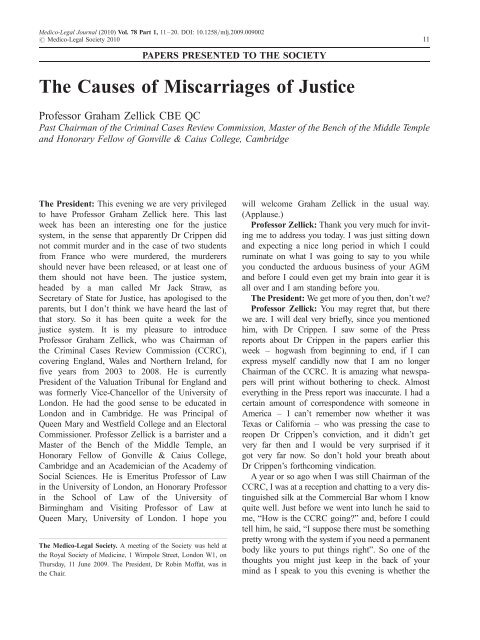
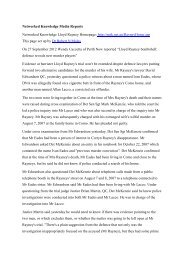
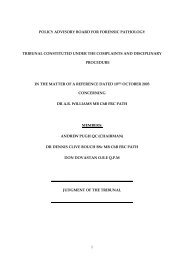
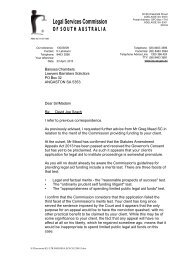
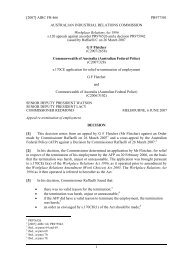
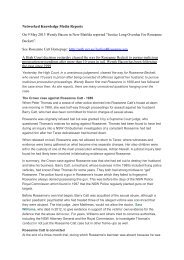
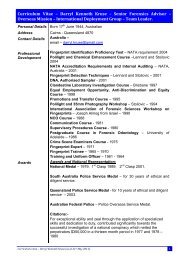
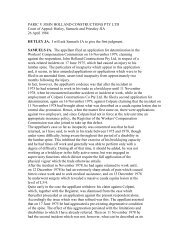
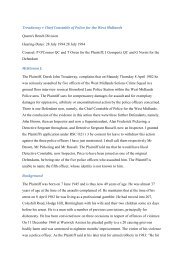
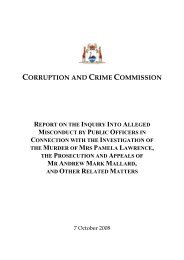
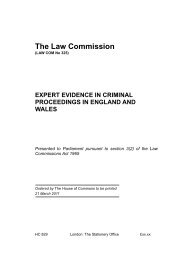

![R v Gilham [2012] NSWCCA 132 - verdicts of acquittal](https://img.yumpu.com/40383571/1/184x260/r-v-gilham-2012-nswcca-132-verdicts-of-acquittal.jpg?quality=85)
